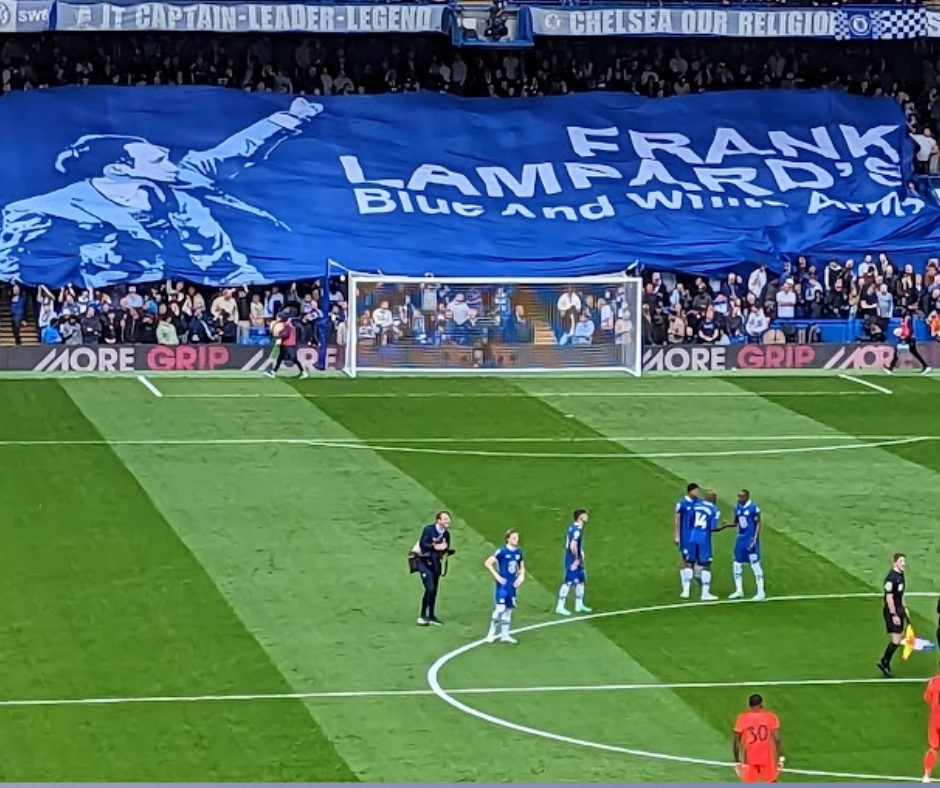Frank Lampard vs Graham Potter is a debate that will make Chelsea fans rage.
But for the sake of argument, let’s compare the two managers
Frank Lampard, a Chelsea legend as a player, faced considerable challenges as a manager despite an encouraging start. Graham Potter, lauded for his modern and tactically progressive approach at Brighton, found transitioning his strategies to Chelsea’s star-studded squad more challenging than expected. As we dissect their tenures, we will consider their handling of squad dynamics, tactical implementations, achievements, and their overall impact on the club.
This exploration isn’t intended to tarnish their contributions or capabilities as football managers but rather to analyse their respective tenures at Chelsea objectively. It’s important to remember that leading a club as massive as Chelsea is daunting, where pressures are immense, and the margin for error is slim.
Given the circumstances, this analysis mostly ignores Lampard’s second spell in charge.
Frank Lampard’s First Tenure: A Bright Start Tainted by Turbulence
Frank Lampard’s reign as Chelsea’s manager brought a sense of hope and excitement to Stamford Bridge. As a club legend and one of the most successful midfielders in the club’s history, fans and players met his appointment with enthusiasm. However, despite a promising start, his tenure was marred by issues that led to his dismissal just 18 months into the job.
Lampard’s tenure started impressively, considering the challenging circumstances he found himself in. In his first season, he guided the club to a fourth-place finish in the Premier League and reached the FA Cup final despite the club’s transfer ban.
His commitment to promoting youth was widely praised, with players like Mason Mount, Tammy Abraham, and Reece James emerging as key figures in the team. Lampard’s ability to nurture young talent was undoubtedly a standout aspect of his managerial tenure.
However, despite this promising start, Lampard’s time at the helm was not without its issues. Expectations were high after a significant investment in the transfer market ahead of his second season. Yet, Chelsea underperformed, with disappointing results leading to his dismissal.
Lampard struggled to integrate the new signings into the team effectively, with big-name arrivals like Timo Werner and Kai Havertz failing to hit their strides under his management. Moreover, Lampard’s tactical approach was often questioned, with critics suggesting that his team lacked a clear playing style.
The pressures at Chelsea and the high expectations placed on Lampard eventually led to his downfall. His dismissal, although shocking considering his status as a club legend, seemed inevitable given the poor run of form and mounting criticism.
Comparing Lampard’s reign with Potter’s is not straightforward, as both faced unique challenges and pressures. While Lampard struggled with incorporating new signings and delivering consistent results, Potter struggled to manage inherited problems and implement a new tactical philosophy. However, both managers’ reigns ended with Chelsea in a precarious position, leading to their early departures.
Graham Potter’s Reign: A Missed Opportunity or an Inevitable Downfall?
Graham Potter’s management at Chelsea was initially seen as a promising prospect. Coming from Brighton, he brought a unique approach and a reputation for playing attractive, possession-based football. However, his time at Stamford Bridge was marred by a distinct lack of success, leading many to question if he was the worst manager the club had ever had.
Potter’s tenure began with a tumultuous inheritance from Thomas Tuchel. Despite Tuchel’s Champions League triumph, his reign ended with a startling decline in defensive solidity and a series of discord with key forwards. As a result, when Potter stepped in, he was faced with an uphill battle in restoring order and harmony within the squad.
Potter’s tactical philosophy starkly contrasted with Tuchel’s defensive approach, which initially won him some support among fans and players alike. He introduced a new playing style aiming for fluidity and dominance in possession, a refreshing change to the somewhat restrictive gameplay under Tuchel.
However, his strategies did not translate into the anticipated success. Chelsea’s performance under Potter’s management was consistently inconsistent, with impressive victories marred by unexpected defeats. This inconsistency was further highlighted by a weak defensive line, resulting in a string of disappointing results.
The lack of improvement in the team’s performance under Potter’s leadership ultimately led to his dismissal, a mere 18 months after his arrival. Despite his initial promise and differing approach, his inability to effectively manage Chelsea’s plethora of talent and execute a successful strategic plan led many to view his tenure as the worst in Chelsea’s history.
While Potter’s managerial stint at Chelsea was undoubtedly difficult for the club, is it fair to deem him the worst manager in the club’s history? The next section will compare Frank Lampard’s reign, evaluating the different challenges each manager faced and their respective impacts on the club.
Given all the factors discussed above, it is difficult to label either Frank Lampard or Graham Potter as the worst manager in Chelsea’s history. However, several key points can be considered to deliver a fair assessment.
Style of Play and Tactical Approach
Lampard, a club legend, favored an attacking style of play and gave opportunities to several young players from the club’s academy. His tactics were often viewed as naive, and he struggled with consistency, especially in the second season. Despite these drawbacks, he led the team to a top-four finish and the FA Cup final in his first season.
On the other hand, Potter, renowned for his modern approach and possession-based style of play, struggled to implement his tactics successfully at Chelsea. Despite showing initial promise, his tenure saw Chelsea slide into the bottom half of the Premier League table and early exits from cup competitions.
Handling of Transfers and Squad Management
Lampard’s transfer ban in his first season meant he had limited options. However, in his second season, despite significant investment in players like Timo Werner, Kai Havertz, and Ben Chilwell, Lampard struggled to get the best out of his squad.
Potter, taking over after Tuchel’s dismissal, inherited a team that had recently seen significant investment. However, his inability to extract the best from these players was evident, and a lack of squad harmony was a recurring theme during his tenure.
Legacy at the Club
Frank Lampard’s legacy as a player at Chelsea is unquestionable. As a manager, despite a turbulent second season, he brought through promising young talents such as Mason Mount and Reece James and maintained a good rapport with fans throughout his tenure.
Graham Potter, while having a strong reputation before his Chelsea tenure, struggled to win over the Chelsea fanbase. The team’s performances under him, combined with an apparent disconnect between his style of play and the squad’s capabilities, led to his dismissal after a disappointing season.
Frank Lampard vs Graham Potter – Final Verdict
Considering the performances, tactics, squad management, and overall impact on the club, Frank Lampard’s tenure, while not without its challenges, showed promise and left a lasting legacy. However, Graham Potter’s reign was marked by significant underperformance given the resources at his disposal, leading to a downturn in Chelsea’s fortunes.
While it is challenging to label either as the “worst” manager, based on the evidence provided, Graham Potter’s tenure was arguably more damaging to Chelsea in the short term. Regardless, both managers’ tenures underline the pressures and demands of managing a club of Chelsea’s stature, and the inherent challenges that come with it.

